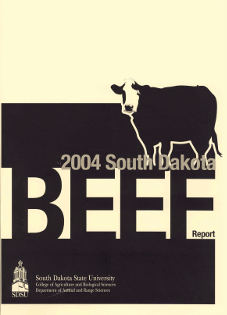Effects of an Anabolic Implant and Transport on Metabolic Status and Muscle Traits of Feedlot Steers
Document Type
Report
Report Number
2004-4
Publication Date
2004
Summary
A study was repeated over 2 years to determine the effect of feeding different levels of dry distillers grains with solubles (DDGS) and wet distillers grains with solubles (WDGS) on the performance of finishing cattle. In each year, 120 steers (756 ± 22 lb) were weighed, and randomly allocated to 15 pens. The pens were then assigned to one of five treatments: 1) corn-soybean meal (CON); 2) 20% DDGS; 3) 20% WDGS; 4) 40% DDGS; or 5) 40% WDGS. The basal diet consisted of 10% alfalfa hay, 4% molasses, 2% supplement, 10.5% SBM and 73.5% cracked corn. The WDGS and DDGS were added to replace all the SBM and part of the cracked corn. Steers were fed these diets for 138 and 129 days in years 1 and 2, respectively. Body weight was recorded prior to feeding at the start of the trial and every 28 days. Steers were harvested at a commercial facility and carcass data were collected. No treatment x year interactions occurred, thus data were pooled over the 2 years. There was an interaction between wet vs. dry and 20% vs. 40% distillers grains with solubles (DGS) for cumulative DMI. Steers fed 20% and 40% DDGS had the highest DMI, but feeding 40% WDGS significantly depressed (P < 0.01) DMI. Cumulative ADG was similar across all treatments; however, steers fed 40% DGS had greater G:F (P < 0.05) than those fed 20% DGS, and those fed WDGS were more efficient (P < 0.01) than those fed DDGS. Pooled carcass data showed that steers fed DGS had greater (P < 0.01) 12th rib fat compared to CON resulting in steers fed DGS having greater (P < 0.05) Yield Grades compared to CON steers. Steers fed 20% DDGS and 20% WDGS had numerically higher (P < 0.05) marbling scores compared to steers fed CON, 40% DDGS and 40% WDGS. Hot carcass weight, ribeye area, and percent kidney, pelvic, and heart fat were similar across all treatments. In conclusion, feeding DDGS and WDGS at 20 and 40% of the diet DM can be used to replace SBM in finishing diets to achieve similar gains and efficiencies. However, Yield Grades were greater for steers fed DGS compared to those fed the corn-soybean meal diet.
Number of Pages
7
Format
application/pdf
Language
en
Publisher
South Dakota State University
Rights
Copyright © 2004 South Dakota State University
Recommended Citation
McCarthick, Josh W.; Pritchard, Robbit H.; Holt, Simone M.; and Clapper, Jeffery A., "Effects of an Anabolic Implant and Transport on Metabolic Status and Muscle Traits of Feedlot Steers" (2004). South Dakota Beef Report, 2004. 5.
https://openprairie.sdstate.edu/sd_beefreport_2004/5

